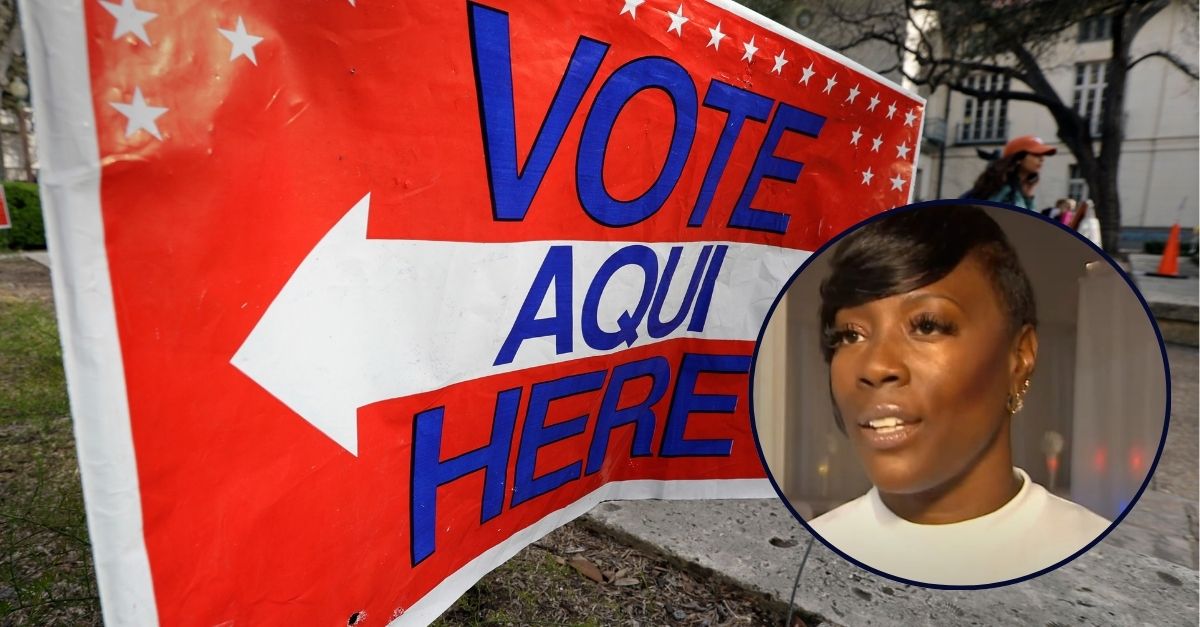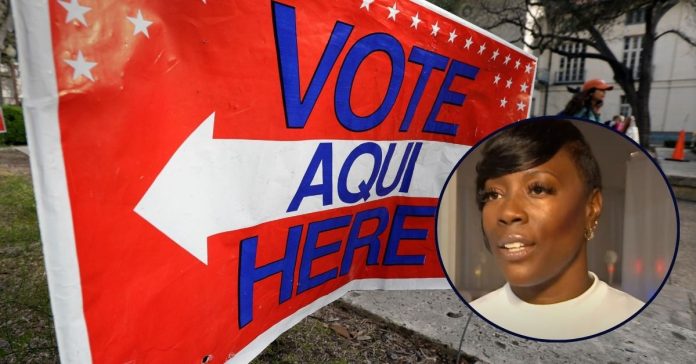
Background: A sign directs voters to a Texas primary election polling site on the University of Texas campus, Tuesday, March 6, 2018, in Austin, Texas. (AP Photo/Eric Gay). Inset: Crystal Mason appears for an interview after her acquittal in March 2024 (YouTube screengrab/WFAA).
Crystal Mason, a mother of three, was sentenced to spend five years in prison for casting a ballot in 2016 while she was a convicted felon on probation, but now a Texas appeals court has formally acquitted her after it determined the evidence to convict her of illegally voting simply did not muster up.
“I am overjoyed to see my faith rewarded today,” Mason said, according to a statement released Thursday through her attorneys at the American Civil Liberties Union. “I was thrown into this fight for voting rights and will keep swinging to ensure no one else has to face what I’ve endured for over six years, a political ploy where minority voting rights are under attack. I’ve cried and prayed every night for over six years straight that I would remain a free Black woman.”
The ruling from the Second Court of Appeals in Texas is the culmination of a seven-year battle that began when the 49-year-old woman was charged with illegally voting in the 2016 election, as Law&Crime previously reported. That ballot was ultimately not even cast, but Mason was found guilty nonetheless.
From the outset, Mason said she was unaware that she was ineligible to vote in 2016 as a felon on supervised release for a federal tax crime. She told prosecutors that a poll worker had assisted her when she went to the booths in Tarrant County that year and it was under that guidance that she cast her ballot.
Reasonable belief that she simply did not know she was ineligible went to the core of her appeal and to Justice Wade Birdwell’s opinion who wrote Thursday that one of the poll workers who claimed to have assisted her in 2016 essentially failed to do his due diligence.
For example, Birdwell noted, the poll worker who said at Mason’s trial that he assisted her, could have called the Tarrant County Elections Administration, just as he did with another voter who had registered too late.
It was “possible that he would have been told Mason was not on the list of registered voters because of her felony conviction,” Birdwell wrote.
Mason had also testified that she had not read a series of disclaimers on a portion of the provisional ballot stating that felons could not vote and instead had relied on another poll worker who said she could. While prosecutors disputed this successfully in the past, Birdwell turned to her testimony to support his ruling:
Mason testified that when confronted with the fact that she was not shown as a registered voter in the polling-place or online list of registered voters, it never crossed her mind that she was ineligible to vote.
Instead, she was thinking that she (a) still had a voter registration card that she hadn’t brought with her, (b) was living at the same residence where she had been living when she voted in 2008, and (c) had her ID with her; thus, she did not understand why she would not be on the list of registered voters.
When asked whether she would have jeopardized her freedom to vote had she known she was ineligible to do so, Mason answered no.
Mason’s conviction on the voting fraud charge was upheld by the Second Circuit in 2022 but, as Law&Crime previously reported, the court ordered a review on the evidence particular to her intent.
Key in the ruling was the finding that a 2021 Texas election code specified that residents could not be convicted of illegally voting solely for signing a provisional ballot. There had to be proof beyond a reasonable doubt that the person in question meant to act fraudulently.
Birdwell highlighted this Thursday saying that construing the statute to mean a person “can be guilty even if she does not ‘know the person is not eligible to vote’ is to disregard the words the Legislature intended.”
The opinion states:
We conclude that the quantum of the evidence presented in this case is insufficient to support the conclusion that Mason actually realized that she voted knowing that she was ineligible to do so and, therefore, insufficient to support her conviction for illegal voting under Election Code Section 64.012(a)(1). In the end, the State’s primary evidence was that Mason read the words on the affidavit. But even if she had read them, they are not sufficient — even in the context of the rest of the evidence in this case — to prove beyond a reasonable doubt that she actually knew that being on supervised release after having served her entire federal sentence of incarceration made her ineligible to vote by casting a provisional ballot when she did so. See Tex. Elec. Code Ann. § 64.012(c).
Have a tip we should know? [email protected]

